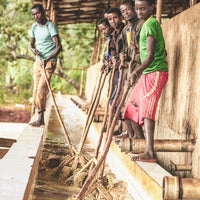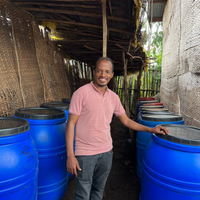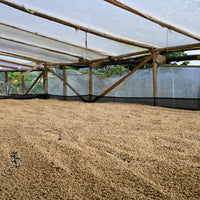Origin: Colombia
Region: Trujillo, Caicedonia
Altitude: 1500 - 1950
Farmer: Rigoberto & Luis Eduardo Herrera
Farm: Finca Potosi
Variety: Colombia
Process: Natural
Tasting Notes: Balanced and boozy with notes of stonefruit, orange and chocolate finish.
Granja La Esperanza is a group of 6 farms in El Valle del Cauca and Cundinamarca owned by Rigoberto and Luis Eduardo Herrera, two brothers from a traditional coffee family. Their grandfather owned a very large Hacienda in the region of Trujillo that was slowly sold off over decades. The Herreras left Colombia in the 1970’s to study engineering abroad but returned in 1998 with a dream to reconstruct their grandfather’s Hacienda and get back into coffee farming. Cafe Granja La Esperanza has taken great strides under the brothers leadership and forward thinking vision. In the last decade, the farm has moved from traditional 'C' market coffees, to the more delicate and exquisite varieties coveted by the specialty coffee industry. The farm looks like a garden full of different coffee varietals and is one of the most progressive and experimental farms in the world. What we are witnessing here is an approach more akin to the rigours of fine wine-making where varieties are chosen more for their flavor attributes than their disease resistance. Many innovations have led to this excellence in the cup.
A hand picked group of pickers for example are trained to pick only the ripest cherries and are paid by the day, rather than the weight to discourage filling up baskets with unripe fruit. Rigoberta describes the 3 pillars upon which their control of coffee quality is built as 'The Genetic Material of the Variety, the Terroir and the Human Talent. Of the 3, the people who work at Granja La Esperanza are the most important resource'. This enlightened approach doesn't stop there - every delivery to the mill is tested with a brix meter, to measure sugar levels in the fruit - how wine industry is that! The processing and drying can then be adjusted accordingly. There are actually 95 different quality hurdles in place for the beans to negotiate from nursery to port! This tremendous investment of human resources, time, energy and money can only come about through total dedication.







